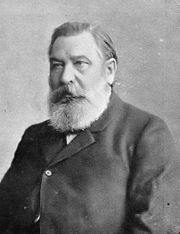Heinrich Von Treitschke
- Heinrich Von Treitschke
-
Heinrich von Treitschke
Heinrich Gothard von Treitschke (15 septembre 1834 à Dresde - 28 avril 1896), est un historien et théoricien politique allemand.
Il fut professeur à l'université de Berlin, député nationaliste de 1871 à 1884, il soutint la politique de Bismark après avoir publié en août 1870 un ouvrage intitulé : « Que réclamons-nous de la France ? L'Alsace. ». Comme Edouard Drumont en France, ses thèses antisémites rencontrent un grand succès en Allemagne, où les nazis reprendront plus tard sa célèbre formule : « Les Juifs sont notre malheur ».
Sa philosophie politique s'articule autour de la formule : "L'État est puissance ("Der Staat ist Macht"). Emile Durkheim l'a analysée dans sa brochure : L'Allemagne au-dessus de tout (1915).
Publications
Cette section est vide, pas assez détaillée ou incomplète. Votre aide est la bienvenue !
 Portail de l’histoire
Portail de l’histoire
Catégories : Historien allemand | Naissance en 1834 | Décès en 1896
Wikimedia Foundation.
2010.
Contenu soumis à la licence CC-BY-SA. Source : Article Heinrich Von Treitschke de Wikipédia en français (auteurs)
Regardez d'autres dictionnaires:
Heinrich von Treitschke — Heinrich Gotthardt von Treitschke (* 15. September 1834 in Dresden; † 28. April 1896 in Berlin) war ein deutscher Historiker, politischer Publizist und Mitglied des Reichstags von 1871 bis 1884, zunächst als nationalliberaler Abgeordneter, seit… … Deutsch Wikipedia
Heinrich von Treitschke — Heinrich Gotthard von Treitschke (September 15, 1834 ndash; April 28, 1896) was a nationalist German historian and political writer during the time of the German Empire.Early life and teaching careerTreitschke was born in Dresden. He was the son… … Wikipedia
Heinrich von Treitschke — Heinrich von Treitschke. Heinrich von Treitschke (15 de septiembre de 1834 28 de abril de 1896) fue un historiador y politólogo alemán de inclinación nacionalista que vivió en época del Imperio alemán … Wikipedia Español
Heinrich von treitschke — Heinrich von Treitschke. Heinrich Gothard von Treitschke (15 septembre 1834 à Dresde 28 avril 1896), est un historien et théoricien politique allemand. Il fut professeur à l université de Berlin, député nationaliste de 1871 … Wikipédia en Français
Heinrich von Treitschke — Heinrich von Treitschke. Heinrich Gothard von Treitschke (15 septembre 1834 à Dresde 28 avril 1896), est un historien et théoricien politique allemand, membre du Parti libéral national. Il fut professeur à l université de Berlin, député… … Wikipédia en Français
Eduard Heinrich von Treitschke — (* 2. Januar 1796 in Dresden; † 10. März 1867 ebenda) war ein königlich sächsischer Generalleutnant. Leben und Wirken Er war der jüngste Sohn der Eltern Dr. Carl Friedrich Treitschke, Hof und Justizrat in Dresden und seiner Frau Elenore… … Deutsch Wikipedia
Heinrich Leo von Treitschke — (* 30. Januar 1840 in Dresden; † 17. Juni 1927 ebenda) war ein sächsischer Offizier, zuletzt General der Infanterie. Inhaltsverzeic … Deutsch Wikipedia
TREITSCHKE, HEINRICH VON° — (1834–1896), German historian and politician. Treitschke was a member of the National Liberal Party and author of a popular German history of the 19th century (Deutsche Geschichte im 19. Jahrhundert, 5 vols., 1879–94). He became well known as a… … Encyclopedia of Judaism
Treitschke, Heinrich von — born Sept. 15, 1834, Dresden, Saxony died April 28, 1896, Berlin German historian and political writer. Son of a Saxon general, Treitschke studied at Bonn and Leipzig and then taught history and politics at a number of German universities. A… … Universalium
Treitschke, Heinrich von — (1834–1896) Born in Dresden, Heinrich von Treitsche was one of the most well known German historians of the later nineteenth century. Appointed as Leopold von Ranke ’s successor at the Humboldt University in 1874, Treitschke’s name is closely… … Encyclopedia of the Age of Imperialism, 1800–1914

